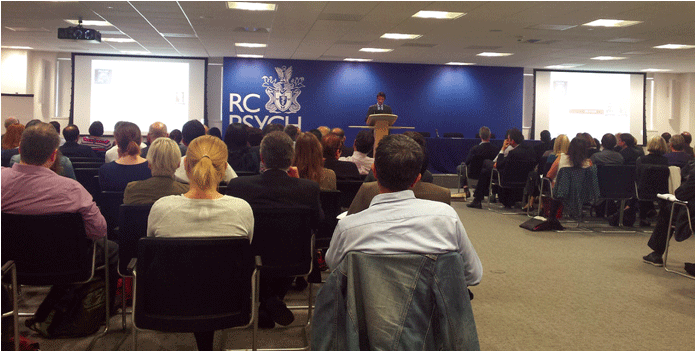
With over 360 delegates from all over the country and other countries (including Australia, Singapore, Canada, Pakistan, Netherlands, New Zealand, Belgium, Sweden and Czech Republic), the Faculty’s Annual Meeting was a great success. This oversubscribed event was held at the recently acquired new headquarters of the Royal College of Psychiatrists in London and has indeed received excellent feedback. The programme covered a number of clinical management, medico-legal and service delivery issues that were discussed in the form of key note talks and a selection of seminars.
A number of eminent clinicians, barristers and academic speakers along with the support received from service users, have certainly contributed to the success of the conference. This event highlighted the real meaning of families, scientists and clinicians working together in enhancing research, education and clinical care. A senior psychiatrist who is also a former patient with brain injury discussed his rocky journey, surviving a significant brain injury and being able to resume clinical practice and also contribute to medical education. It was particularly inspiring to hear about specific neuropsychological symptoms from someone who is able to articulately describe these and give a first-hand experience of what they mean.
Following introductions from Dr Rafey Faruqui, Faculty Chair and Dr George El-Nimr, Academic Secretary, Professor Nick Fox discussed the role of neuroimaging in the management of dementia of the working age. Professor Fox discussed how this field is now moving away from a purely exclusionary approach towards the use of imaging as a positive predictive diagnostic tool. Professor Fox has also made reference to functional imaging and recent developments in molecular imaging. Within the same theme of neurodegenerative conditions, Dr Ed Wild has presented recent research data and research developments that do provide hope along the difficult journey of hunting for a cure for Huntington’s disease. Furthermore, Dr Wild discussed how working with pre-manifest mutant gene carriers can provide a model that could potentially be adopted in studying other neurodegenerative conditions.
A subsequent session was dedicated to discuss Neuropsychiatry on the frontline. Professor George Tadros has argued the case for psychiatrists to work more readily within an acute hospital setting. Arguably, this would not only improve mental health care for our patients but is also more appreciated by colleagues who work in acute medical and surgical settings. The positive financial impact of that approach was discussed and highlighted by the RAID model that is adopted in a number of mental health trusts. Similarly, Dr Alex Ball has presented a case for integration of Neuro-rehabilitation and Neuropsychiatry. Nonetheless, the importance of maintaining specialism was argued to be of particular relevance to patients with acquired brain injury.
A session entitled “The Mind on the Operating Table” explored the history of psychiatric neurosurgery in the mid-20th Century which was eloquently presented by Dr Ken Barrett. Professor Marwan Hariz followed that talk discussing current practices of neurosurgery for mental disorders.
A session under the heading of “The Brain on the Move” discussed the coexistence of psychiatric morbidity in patients with movement disorders. The concept of motion and emotion was discussed in details by Professor Andrea Cavanna. A specific talk on the treatment challenges of Tourette’s syndrome was presented by Dr Davide Martino who highlighted the importance of appreciating the role of psychological interventions along with pharmacological treatments, presenting an update on current evidence.
The event was also able to address a number of medico-legal dilemmas; enhancing the understanding of the interaction between the legal system and care services. Relevant topics were explored by eminent presenters form both camps. In addition to key note talks about the uses and abuses of the law in brain injury by Professor Mike Barnes and assessing capacity for the Court of the Protection by Ms Jess Flanagan, Barrister, some of those issues were also discussed in the form of seminars that invited further audience participation. A highly educational and interesting session was presented in the form of a mock trial where pre-prepared court reports were presented and senior clinicians were cross-examined by barristers from opponent parties.
Conference delegates were also able to join various other seminars. These covered a number of clinical topics including movement disorders and social cognition, Parkinson’s disease: beyond motor features, Neuropsychiatric aspects of alcohol misuse, epilepsy and behaviour and brain injury service models.
With a selection of poster and oral presentations, trainees were able to present a number of high quality projects to the conference delegates. Prizes were given to the best poster and oral presentations at the end of the second day of the conference.
The conference programme included a business meeting where members were invited to discuss important training and national issues related to neuropsychiatry. The success of this year’s conference was highlighted and discussions have been held in relation to ideas for next year’s conference that is scheduled to take place on the 15th and 16th September 2016 at the Royal College of Psychiatrists in London.
Key messages:
- The value of Neuroimaging in dementia goes beyond excluding alternative diagnoses.
- Considerable advances have been achieved in studying potential disease modifying treatments in Huntington’s disease.
- There is a case for Neuropsychiatry to have a stronger presence in the general hospital.
- Mental Health professionals should arguably be more involved in shaping the future of Neurosurgical practices for severe mental illness.
ACNR 2015;15(5):22. Online 13/11/2015
